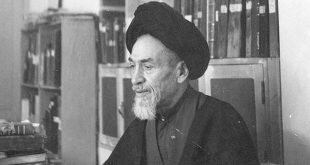Al-Mīrzā Abul-Qāsim b. Muḥammad Ḥasan al-Shaftī, commonly known as al-Mīrzā al-Qummī and al-Muḥaqqiq al-Qummī, was a Shi’a Marja’ in the 12th/18th and 13th/19th centuries.
He was contemporaries with some Qajar shahs and advised them to be tolerant of people and firm in their faith. Performing Salat al-Jum’a (Friday prayer) and Salat al-Jama’a (congregational prayer) were his other activities.
His most important work is his book al-Qawanin and hence he was titled as Sāḥib al-Qawānīn (owner or author of al-Qawanin). Validity of absolute conjecture, conjoining command and prohibition in a single personal subject and permissibility of judgment for a Muqallid according to a fatwa of his Marja’ were some of his special jurisprudential opinions.
Born and Family
Al-Mirza al-Qummi was born in 1150/1737-38 in Darr-i Bagh village (located in Japilq district, about 12 km away from Burujird, in western Iran).
His father, who was from Shaft (a village near Fuman, in Iran), had studied in seminary of Isfahan and then moved to Japliq.
His Education
Al-Mirza al-Qummi studied Arabic and Farsi grammar and literature under his father in his home village, Darr-i Bagh. Then he moved to Khwansar and became a student of Sayyid Husayn Khwansari in fiqh and usul. After a few years he married Khwansari’s sister. Then he emigrated to Karbala, Iraq, and became a student of Muhammad Baqir Bihbahani.
After a while and by getting permission from Bihbahani, he returned to Darr-i Bagh and went to Qaleh Babu village (a village in Japliq) and then went to Kasi Garan school in Isfahan and after that went to Shiraz which coincided with the reign of Karim Khan Zand. He stayed in Shiraz for 2 or 3 years. Then he returned to Isfahan and went to Babu village and started to teach fiqh and usul to some Hawza students. He lived a hard life economically. Then he moved to Qom, where he thought, authored his books, became very well-known in the country and became a Marja’.
His Students
Some of his students are:
- Al-Sayyid Jawad al-‘Amili (the author of Miftah al-karama)
- Al-Shaykh Asad Allah al-Tustari (the author of al-Maqabis)
- Sayyid Muhsin al-A’raji (the author of al-Mahsul)
- Karbasi (the author of al-Isharat)
- Al-Sayyid ‘Abd Allah al-Shubbar (the author of Masabih al-anwar fi hall mushkilat al-akhbar)
- Sayyid Muhammad Mahdi Khwansari (the author of al-Risalat al-mabsuta fi ahwal Abi Basir)
- Sayyid Ali (the commentator on Manzuma written by Bahr al-‘Ulum)
His Scholarly Status
Al-Mirza al-Qummi was known as al-Muhaqqiq al-Qummi. Validity of absolute conjecture, conjoining command and prohibition in a single personal subject and permissibility of judgment for a Muqallid according to a fatwa of his Marja’ were some of his special jurisprudential opinions.
His Socio-political Activities
Al-Mirza al-Qummi was contemporaries with some Qajar shahs, such as Agha Muhammad Khan and Fath Ali Shah. He had correspondence with Fath Ali Shah and in a letter advised Shah to be tolerant of people and in another advised him to be strong and firm in his faith and not to incline toward Sufism.
He performed Salat al-Jum’a (Friday prayer) and Salat al-Jama’a (congregational prayer) in Qom.
His Works
It is said that he authored more than 1000 treatises in various fields. Some of his works are:
- Al-Qawanin al-muhkama fi l-usul: commonly known as al-Qawanin which is book on usul al-fiqh. For years it was regarded as a textbook in Hawza.
- Glosses on al-Sharh ‘ala Sharh al-Mukhtasar.
- Commentary on Tahdhib al-wusul written by al-‘Allama al-Hilli
- Ghana’im al-ayyam fi al-fiqh
- Manahij al-ahkam
- Jami’ al-shitat (in Persian)
- Mu’in al-khawas
- Murshid al-‘awam
- Risalat fi al-usul al-khamsa al-i’tiqadiyya
- Risalat fi qa’ida al-tasamuh fi adillat al-sunan
Demise
Mirza al-Qummi passed away in 1231/1815-16 in Qom. His Demise Date is also reported in 1233/1817-18. He was entombed in Shaykhan cemetery in Qom.
 Ijtihad Network Being Wise and Faithful Muslim in the Contemporary World
Ijtihad Network Being Wise and Faithful Muslim in the Contemporary World
